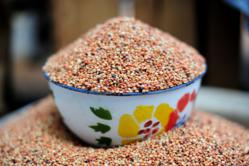London, United Kingdom (PRWEB) March 28, 2012
Nearly one billion people in the world are undernourished, while millions suffer from chronic disease due to excess food consumption. Global demand is growing for agricultural products and food prices are rising, yet roughly one-third of food produced for human consumption is lost or wasted. Climate change threatens more frequent drought, flooding and pest outbreaks, and the world loses 12 million hectares of agricultural land each year to land degradation. Land clearing and inefficient practices make agriculture the largest source of greenhouse gas pollution on the planet.
To address these alarming patterns, an independent commission of scientific leaders from 13 countries released today a detailed set of recommendations to policy makers on how to achieve food security in the face of climate change. In their report, the Commission on Sustainable Agriculture and Climate Change proposes specific policy responses to the global challenge of feeding a world confronted by climate change, population growth, poverty, food price spikes and degraded ecosystems. The report highlights specific opportunities under the mandates of the Rio+20 Earth Summit, the United Nations Framework Convention on Climate Change (UNFCCC) and the Group of 20 (G20) nations.
Food insecurity and climate change are already inhibiting human well-being and economic growth throughout the world and these problems are poised to accelerate, said Sir John Beddington, chair of the Commission. Decisive policy action is required if we are to preserve the planets capacity to produce adequate food in the future. The report was released at the Planet Under Pressure conference where scientists from around the world are honing solutions for global sustainability challenges targeted to the Rio Summit, which will be held on 20-22 June in Brazil.
Make global food security and climate stabilization a reality
The Commission has outlined seven recommendations designed to be implemented concurrently by a constellation of governments, international institutions, investors, agricultural producers, consumers, food companies and researchers. They call for changes in policy, finance, agriculture, development aid, diet choices and food waste as well as revitalized investment in the knowledge systems to support these changes.
Professor Judi Wakhungu, executive director of the African Center for Technology Studies (ACTS), said, As a Commission, we were charged with harvesting the wealth of scientific knowledge and practical solutions that have been accumulated by recent assessment reports on food security and climate change. Together, we carefully distilled the seven most important ways for policy makers to make global food security and climate stabilization a reality.
The Commissions recommendations encourage significantly raising the level of global investment in sustainable agriculture and food systems in the next decade; sustainably intensifying agricultural production on the existing land base while reducing greenhouse gas emissions; and reducing losses and waste in the food system. It’s past time to realize that farms of every size all over the world are fundamental to human nutrition and economic well-being, but they are also facing critical choices with significant implications for the way we manage the planet for long term sufficiency, according to U.S. Commissioner Professor Molly Jahn of the University of Wisconsin-Madison.
Mobilize science and policy for sustainable agricultural practices
Alternative agricultural practices have the potential to deliver benefits for both adaptation and mitigation of climate change and the Commission has urged the UNFCCC to establish a work program that addresses these issues together under the Subsidiary Body for Scientific and Technological Advice (SBSTA). Without an integrated SBSTA work program for agriculture, we risk crafting fragmented global climate policy, says Commission Vice-Chair Dr. Mohammed Asaduzzaman, Research Director at the Bangladesh Institute of Development Studies. Countries like Bangladesh clearly need support for climate-resilient agriculture, but we also need a serious global commitment to reducing greenhouse gas emissions, including in the agriculture sector. Sea level rise threatens major areas of Bangladesh, which already experiences significant environmental migration.
The Commissions report cites recent evidence that closing the gap between potential and actual yields for 16 major crops could increase productivity by more than 50 percent. To produce enough food for our rapidly growing population, much greater investment is needed to dramatically increase agricultural yields now and in the long-term, Commissioner Dr. Nguyen Van Bo, president of the Viet Nam Academy of Agricultural Science. In Viet Nam, we have established model programs to boost rice productivity and quality, mitigate greenhouse gases and increase income for farmers.
Sustainably intensifying agricultural production on existing land, while reducing greenhouse gas emissions from agriculture, is one of the seven Commission recommendations. There have been some impressive successes in sustainably boosting agricultural production, but there is a lot more to be done, says Commissioner Dr. Carlos Nobre of the Brazilian Ministry of Science, Technology and Innovation. Brazil has made strides in reducing poverty while protecting rainforests in the last seven years, but if we do not advance the science and practice of sustainable intensification, our forests and our farming economies will be at risk.
In China, nearly 400 kilograms of chemical fertilizer are used on every hectare of farmland. We have an opportunity and a plan to stop unnecessary greenhouse gas emissions from inefficient farming practices, said Commissioner Professor Lin Erda, director of the Research Centre of Agriculture and Climate Change at the Chinese Academy of Agricultural Sciences. We are mobilizing public policies and budgets towards low-emission crop breeds and conservation of land, water and energy.
In Mexico, agriculture accounts for 77 percent of domestic water use, in part due to substantial subsidies applied to the price of water and electricity for irrigation. We must redirect public subsidies to promote economically and environmentally sound farming practices that conserve finite natural resources, says Commissioner Dr. Adrian Fern

